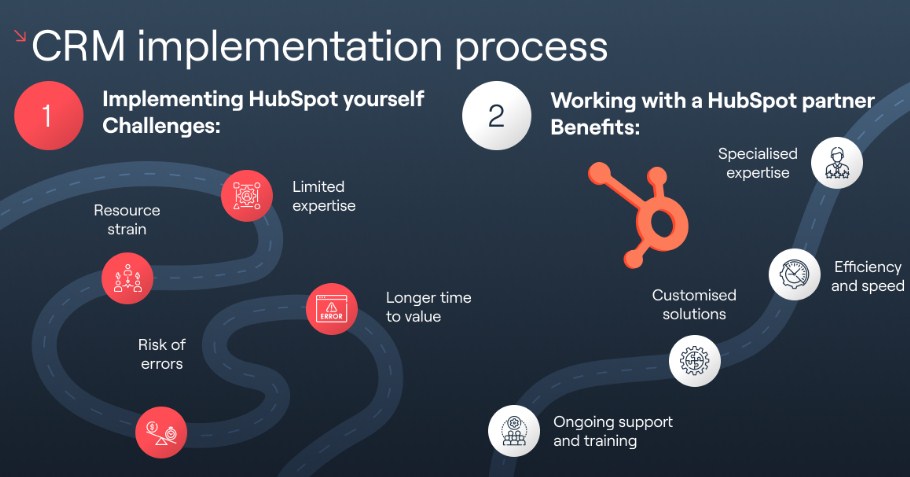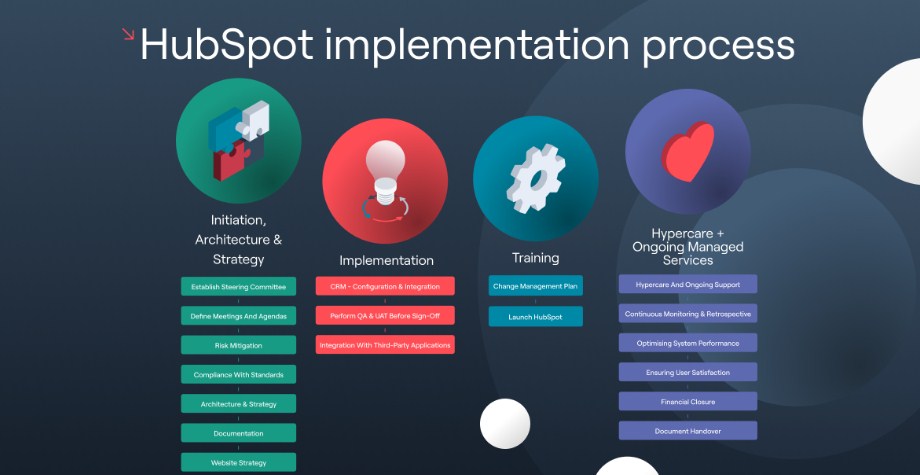Hubspot implementation plan – In today’s competitive business environment, having a streamlined, automated process for marketing, sales, and customer service is more critical than ever. HubSpot, a leading customer relationship management (CRM) platform, can help your business stay ahead of the curve. But how do you ensure its successful implementation? That’s where a well-planned HubSpot Implementation Plan comes in!
This guide will explore everything you need to know about implementing HubSpot, from its benefits to real-world product examples, and how you can create a solid plan to maximize HubSpot’s potential.

What is a HubSpot Implementation Plan?
A HubSpot Implementation Plan is a strategic blueprint that outlines the steps, resources, and timeline needed to successfully integrate HubSpot CRM into your organization’s marketing, sales, and customer service processes. Whether you are setting up HubSpot from scratch or migrating from another platform, a solid implementation plan ensures a smooth transition and effective use of the tool.
Key Components of a HubSpot Implementation Plan:
- Needs Assessment – Understanding your business requirements.
- HubSpot Onboarding – Setting up HubSpot CRM and marketing tools.
- Data Migration – Transferring data from old systems to HubSpot.
- Team Training – Ensuring your team is fully equipped to use HubSpot.
- Ongoing Support and Optimization – Regular updates and improvements for better results.
Why Is HubSpot Implementation Important?
A smooth HubSpot implementation can transform your business, enabling you to automate workflows, improve team collaboration, and enhance customer relationships. Below are some benefits of implementing HubSpot successfully:
1. Centralized Customer Data
HubSpot’s CRM consolidates all customer interactions in one place, allowing your teams to view every touchpoint with a prospect or customer. This leads to better decision-making and customer service.
2. Improved Lead Management
With HubSpot, you can automate lead nurturing, scoring, and tracking, helping sales teams to focus on the most qualified leads. It makes your lead management process more efficient and organized.
3. Sales Process Automation
HubSpot provides tools to automate mundane tasks like follow-up emails and meeting scheduling, allowing your sales team to spend more time closing deals rather than on repetitive administrative tasks.
4. Enhanced Reporting
HubSpot provides robust reporting capabilities that allow you to track the performance of your marketing campaigns, sales performance, and customer service metrics, making it easy to optimize strategies.
5. Seamless Integration
HubSpot integrates with hundreds of apps, including Google Ads, Slack, and Shopify, making it a flexible solution for various business needs.
Real-World Examples of HubSpot Implementation

Let’s dive into a few real-world examples of companies that have successfully implemented HubSpot and the specific benefits they reaped:
1. Company 1: XYZ Tech Solutions
XYZ Tech Solutions, a B2B SaaS company, integrated HubSpot to streamline their sales pipeline and increase conversion rates.
- Problem: XYZ struggled with inconsistent lead tracking and long sales cycles.
- Solution: By implementing HubSpot, XYZ automated their lead capture, lead nurturing, and follow-up processes. The CRM integrated seamlessly with their website and email marketing tools.
- Results: XYZ saw a 40% reduction in the sales cycle and a 30% increase in their lead conversion rate.
2. Company 2: RetailCo
RetailCo, a consumer goods company, used HubSpot to enhance their inbound marketing efforts and improve customer service.
- Problem: Their marketing campaigns lacked targeted communication, and customer service was disconnected from marketing efforts.
- Solution: HubSpot allowed RetailCo to create personalized campaigns, manage customer inquiries via live chat, and automate post-purchase engagement.
- Results: RetailCo’s customer satisfaction improved by 25%, and they saw a 50% increase in repeat purchases.
3. Company 3: FinPartners
FinPartners, a financial advisory firm, adopted HubSpot to improve its client outreach and onboarding process.
- Problem: The firm had a manual process for client outreach and onboarding, which was time-consuming and prone to errors.
- Solution: With HubSpot’s workflows and email sequences, FinPartners automated their onboarding process, including document submission reminders, meeting scheduling, and client communication.
- Results: They reduced onboarding time by 60% and enhanced client engagement from the start.
4. Company 4: HealthTech Innovators
HealthTech Innovators, a healthcare startup, turned to HubSpot to streamline their sales and marketing activities.
- Problem: Disconnected tools and fragmented customer data.
- Solution: HubSpot brought all data into a single platform, allowing the marketing and sales teams to collaborate more effectively.
- Results: Sales productivity improved, and marketing campaigns generated a 40% higher ROI.
5. Company 5: EduTech Solutions
EduTech Solutions, an ed-tech company, leveraged HubSpot’s educational resources to implement their CRM successfully.
- Problem: Manual data entry and inconsistent lead nurturing processes.
- Solution: HubSpot’s CRM automated lead scoring, nurturing, and follow-ups, allowing EduTech to maintain stronger relationships with prospects.
- Results: They saw a 20% increase in enrollment rates and a 35% improvement in lead conversion.
Comparison Table: HubSpot vs. Competitors
| Feature | HubSpot CRM | Salesforce | Zoho CRM | Pipedrive | Freshsales |
|---|---|---|---|---|---|
| Ease of Use | User-friendly, intuitive | Steep learning curve | Moderate | Very easy | Moderate |
| Lead Management | Excellent automation | Advanced, customizable | Good, basic features | Good, simple | Moderate |
| Reporting | Robust and customizable | Complex reporting | Basic | Simple | Advanced |
| Price | Free, paid plans available | Expensive | Affordable | Affordable | Affordable |
| Integrations | 500+ apps | 2000+ apps | 500+ apps | 150+ apps | 50+ apps |
How to Buy HubSpot and Pricing
HubSpot offers various pricing plans based on the features you need and the size of your business. The pricing starts with a Free plan which includes basic CRM features, and it scales up to more advanced features with their paid plans.
HubSpot Pricing:
- Free Plan: Basic CRM tools.
- Starter Plan: $45/month – More marketing and sales tools.
- Professional Plan: $800/month – Advanced features like reporting, marketing automation, etc.
- Enterprise Plan: Custom pricing – Advanced customization and support.
To purchase HubSpot, you can visit their official website and start a free trial to experience its capabilities before upgrading to a paid plan.
Benefits of Using HubSpot
- Automation of Repetitive Tasks 🤖
HubSpot helps automate tasks such as follow-up emails, lead scoring, and customer interactions. This reduces manual work and increases efficiency. - Better Lead Tracking 🧭
HubSpot tracks every interaction a lead has with your company, ensuring you never miss an opportunity. - Comprehensive Reporting 📊
The platform offers detailed analytics and reporting, which helps in optimizing your sales and marketing strategies. - Integration with Third-Party Apps 🔌
HubSpot integrates with many third-party apps, making it adaptable to any business.
FAQs
1. What is HubSpot CRM?
HubSpot CRM is a free customer relationship management tool designed to help businesses manage contacts, sales pipelines, and customer interactions.
2. Can HubSpot be used by small businesses?
Yes, HubSpot offers a free plan that is ideal for small businesses to get started with CRM without the need for a large budget.
3. How long does it take to implement HubSpot?
Implementation time depends on your business needs, but it typically takes between 1-3 months for full integration and training.
4. Does HubSpot provide customer support?
Yes, HubSpot provides 24/7 customer support via live chat, phone, and email.
5. Is HubSpot worth the investment?
For many businesses, HubSpot’s automation features, ease of use, and scalability make it a worthwhile investment that can help grow sales, improve customer service, and enhance marketing strategies.
Conclusion
Implementing a HubSpot CRM can revolutionize your business operations, from improving lead management and sales processes to providing better customer service. By following the right HubSpot Implementation Plan, you can leverage this powerful tool for your business success. Whether you are a small startup or a large enterprise, HubSpot’s flexibility and extensive features make it a top choice for any organization looking to streamline its marketing and sales efforts.
Ready to get started? Sign up for HubSpot today and watch your business grow!
By following these guidelines, your HubSpot Implementation Plan will help ensure that you are equipped to integrate HubSpot seamlessly into your workflow. Whether you’re looking to automate sales, track leads more efficiently, or improve your overall customer relationship strategy, HubSpot is a fantastic tool for the job!
Read More >>>
- What is HubSpot Used For? Key Features, Benefits, and How to Get Started
- HubSpot CRM: The Ultimate Guide to Boost Your Sales & Customer Relationships